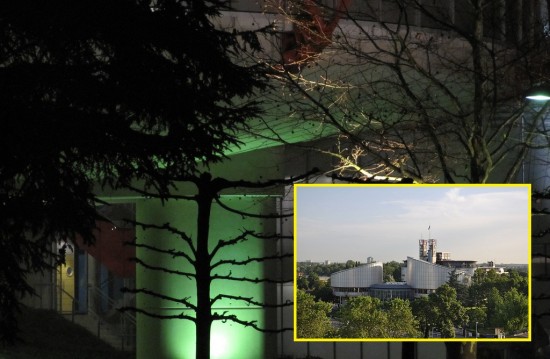The media should use ECHR’s judgement in protection of the human rights
Published in Analyses
on 20 - 02 - 2017 Author: Мирјана Најчевска
- How to use the judgement of the European Court of Human Rights? Photo: francois schnell/Wikipedia, 2011
The judgements of the European Court for Human Rights (ECHR) are a powerful tool in the hands of media when they play their control role in the society, especially when they try to exercise their control over the government
Author: Mirjana Najchevska, PhD, human rights expert
Informing the public when it comes to ECHR’s judgements must not be reduced to simple conveyance of the information. The crucial element of the proper informing on the ECHR’s judgements should be their proper analysis and proper placement of their essence in the broader context of the rule of law and the operation of the state. This is the only way the media can become part of ECHR’s complex mission, i.e. protectors of the rights of the individuals and promoters of solutions that would decrease the violation and the infringement of those rights.
As opposed to the relatively limited interest that the media usually manifest when it comes to ECHR’s judgements, the judgement on the forcible ejection of the journalists during the parliamentary debate (Case of Selmani and others v. the Former Yugoslav Republic of Macedonia) caused ample media interest:
- Judgement on “Black Monday” – Strasbourg in favor of the journalists ejected from the Parliament
- MDC: The decision of the court in Strasbourg is a significant victory for the freedom of expression in the country
- Strasbourg ruled in favor of the journalists who were ejected from the Parliament on Black Monday
- Strasbourg ruled in favor of the journalists ejected from the parliamentary debate on the Budget
- Strasbourg rules in favour of journalists who were removed on “Black Monday”
- …
The predominant majority of the media that published the news, gave but short information on Strasbourg’s judgement, which explains the event that was the cause for lodging of the complaint to the ECHR and at least one of the Articles of the European Convention on Human Rights that the ECHR considers violated. A very tiny remnant (Vecher, Alfa TV, Sitel TV, Infomax, Kurir, Dnevnik, Kanal 5…) paid slight or just marginal attention.
Some media published the Media Development Center’s statement, which emphasizes that the judgement determines
violation of the right of fair trial, due to the decision of the Constitutional court not to organize oral hearing
This decision is also a significant boundary stone in the fight for freedom of expression in Macedonia
it can be used for protection of the rights of all journalists and media in states under jurisdiction of the Court in Strasbourg
Some media republished the judgement’s explanation authored by Akademik, which contains parts of the judgement and explanation of the violations of Article 6 and Article 10 of the European Convention on Human Rights.
Large number of media republished the statement of the Association of Journalists of Macedonia, in which it requests Constitutional court’s liability:
The court missed a historical chance to verify one apparent obstruction of the freedom of expression. Now is the time to face liability. If the constitutional judges had even rudimentary human and professional integrity and credibility, they would’ve resigned immediately after this decision.
There are no democratic institutions in the Republic of Macedonia that could defend the freedom and the rights of citizens when they are violated by the government. This was proven correct by yesterday’s judgement of the European Court of Human Rights regarding the “Black Monday” case, when the journalists were forcibly ejected from the Parliament.
Speaking about the judgement, Selmani highlighted that AJM shall initiate meetings with the institutions, courts, legislative and executive branch of government, during which he shall request appropriate acting upon European Court’s decision.
The domestic bodies ought to face liability for this violation, they should find a way to establish mechanisms that would prevent such violations of human rights in the future. That should comprise certain normative changes that would establish preventive mechanism to prevent such violations in the future, Medarski said.
This vast array of information related to ECHR’s judgement represents a positive leap forward in terms of the informing on this area, strengthening the media monitoring over the government and active inclusion of the media in inquesting the state institutions’ liability for the violations of the human rights and the fundamental freedoms.
It is of utmost importance for the media to go much further than this primary level of informing and begin an in-depth analysis of the judgement and to use it in the building of state’s legal and institutional system and for greater protection of the rights and the freedoms of citizens.
The further profound reading and analyzing of the EHCR’s judgement should first pay focus on ECHR’s request which says that the Constitutional court should be treated as a court (and not as a political body):
The Court (ECHR) emphasises that in proceedings before a court of first and only instance (such as the Constitutional court), the right to a “public hearing” entails an entitlement to a “public hearing” under Article 6 § 1 unless there are exceptional circumstances that justify dispensing with such a hearing.
This request opens not only the possibility for reactions upon every future refusal by the court to hold a public hearing, but a possibility to reexamine all past situations when the Constitutional court has refused to hold a public hearing, and by doing so it has violated the Article 6 of the European Convention on Human Rights.
The treatment of the Constitutional court as a court of first instance allows the submission of a request upon the principle of mutatis mutandis (principle of general equality), which means asking for application of the provision 75 of the Law on Courts to the constitutional judges, according to which unprofessional and irresponsible performing of the duty judge is considered.
if the European Court of Human Rights has made a decision that determines violation of the right of fair trial according to the Article 6 of the European Convention on Human Rights…
The second element that could be of media’s interest is ECHR’s attitude that
The Court reiterates that the expression “prescribed by law” in the second paragraph of Article 10 (of the European Convention on Human Rights) not only requires that the impugned measure should have a legal basis in domestic law, but also refers to the quality of the law in question…
This formulation allows the problem to be addressed to the unjudicial laws, which allow plenty of state bodies’ activities contrary to the law to be promulgated as lawful, thus unable to be disputed before court.
Moreover, the ECHR goes a step further and addresses the problem either to the authorities’ lies that there had been allegations for tensions related to the debate in the Parliament, or to the absence of appropriate informing and preparation in situation when such tensions may arise.
…it (ECHR) notes that no information was provided as to whether any measures had been taken and preparation made in response to those “announcements”, “indications and expectations”.
Third, and exceptionally important thing is that in the entire judgement, ECHR refers to media’s specific watchdog function, which means that the state institutions ought to act in a way that won’t prevent the media to perform this function of theirs.
It (ECHR) reiterates that the “watch-dog” role of the media assumes particular importance in such contexts, since their presence is a guarantee that the authorities can be held to account for their conduct vis-à-vis the demonstrators and the public at large when it comes to the policing of large gatherings, including the methods used to control or disperse protesters or to preserve public order.
Media are watchdogs, and the most difficult part of this mission is to protect the human rights and freedoms from violations by the state and the government.

